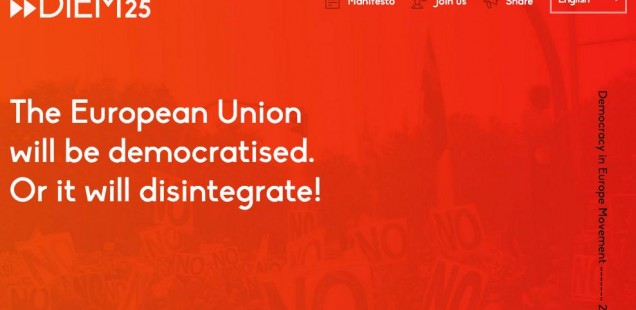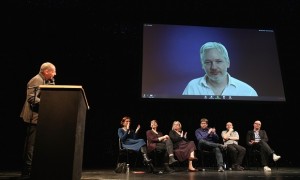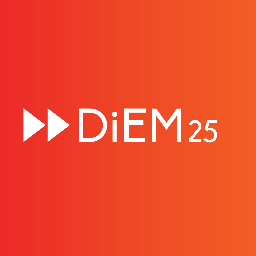DiEM25: A manifesto Close to European Pirates | PirateTimes

DiEM25: A Manifesto Close to European Pirates
This post is also available in: Greek
The ‘Democracy in Europe Movement 2025′ (DiEM25) was launched by its instigator Yannis Varoufakis, the former Greek Minister of Finance, on 9 February 2016 in Berlin. DiEM25, a cross European left-wing movement, attracted Pirates’ attention because of its similarities. The movements hold similar positions on democracy, citizens’ participation on decision making, transparency, decentralization and criticizing corporate lobbyists for their influence on politics in Europe.
Varoufakis, in his launching speech for the movement, stressed that he identified a democratic deficit in Europe. We need to become more democratized again. Decisions should be taken by the people, as citizens of countries, in regions or municipalities.
“One simple, radical idea is the motivating force behind DiEM25: Democratize Europe by 2025! For the EU will either be democratized or it will disintegrate!”
Varoufakis called for a Constituent Assembly of European Representatives, aiming to define a European Constitution. The launch made a great impact since it was attended by many well known celebrities from a variety of fields: European left, green politics, the global economy, human rights activists, artists, philosophers, filmmakers, journalists and many others from the academic community. To name a few of the guests: Julian Assange (Wikileaks founder, live from Ecuador’s embassy in London), Brian Eno (the famous rock star who wrote the music for the introductory video of DiEM25), Slavoj Žižek (Slovenian philosopher) and James K. Galbraith (the economist).

Why Pirates feel close to DiEM25
There were times in Varoufakis’s launching speech that made you think he’s a real pirate! He requested full transparency in decision-making:
“EU Council, Ecofin, FTT and Eurogroup Meetings to be live-streamed which would not cost anything, as he noted. Minutes of European Central Bank governing council meetings to be published a few weeks after the meetings have taken place. All documents pertinent to crucial negotiations, e.g. trade-TTIP, ‘bailout’ loans, Britain’s status, affecting every facet of European citizens’ future to be uploaded on the web. A compulsory register for lobbyists that includes their clients’ names, their remuneration, and a record of meetings with officials, both elected and unelected”.
Pirates are particularly keen on transparency, it’s in their basic principles and they are the first to implement it in every activity. Most Pirate parties worldwide make public, on the internet, the minutes of their board meetings, in text and sound, to enable everyone interested immediate access to them. Besides, whoever wants to – without necessarily being a member of any Pirate party – may attend these meetings.
Especially the “democratic deficit within the EU” is mentioned by the European Pirates (PPEU) in their Common European Election Programme (CEEP) for the Elections of the European Parliament in 2014, that was adopted in Athens. The CEEP of PPEU goes:
“The democratic deficit within the European Union has existed since its formation and has not been sufficiently addressed in the course of the integration process. An important goal of all PIRATES is to build a solid democratic foundation for the Union. In order to achieve that goal it is crucial to ensure that political processes are more citizen friendly.Together we must encourage the development of a common European space for culture, politics and society, and protect the existing rich and diverse cultures that exist within the Union. The EU must live up to its own principles on subsidiarity. Decisions should not be taken at an EU level if they can be better resolved on a national, regional or local level. Equal and easy access to communication and an informed citizenry are basic requirements in legitimate democratic decision making. Political decisions at the European level need to be preceded by Europe-wide debate and allow for the adequate participation of all.
PIRATES strongly believe that all people have the right to fair and equal treatment. It is essential that society respect the rights of minorities. We will stand against discrimination of any kind and oppose movements that act against Human Rights…”
However, apart from the obvious, there are more in depth commonalities between DiEM25 and the Pirates. Similarities that made the Board of Pirate Parties International (PPI) discuss the launch of DiEM25 and deciding to send a German pirate to attend the event in Berlin. Similarities that made Thanasis Gounaris, ex-chairman of the Board of the Greek Pirate Party, to get in personal exploratory contact with Varoufakis and now preparing a official meeting with him. It has also been announced that the Pirate party of Netherlands will sign the manifesto of DiEM25.
Although Varoufakis determined DiEM25 as a left wing movement, he also emphasized many ecological features. Pirates are in the same group with the Greens in the European Parliament; Julia Reda, MEP of the German Pirate Party is a vice president of the Greens / EFA.
Varoufakis did not show up as an alternative politician but rather went straight into mainstream politics with the help of good relations with the media in all European countries. Thereby he was immediately able to acquire great influence and pervasiveness in all ages and young people.
Varoufakis urged every “liberal democrat” to support DiEM25. He said that it is unacceptable for a democrat, no matter where his origin derives, to agree with Wolfgang Schaeuble (finance minister of Germany) that claimed that the elections cannot change the economic policy of Europe. “No democrat can accept it”, Varoufakis said emphatically.
Varoufakis sent multiple messages to multiple recipients in his launch speech in Berlin. Firstly, he sent a message that he is still standing up to the establishment of European politicians, who fought him when he was Finance Minister for his views and succeeded in ousting him from his position. Secondly, he invited all those who consider themselves democrats to join the movement for the democratization of Europe. He also repeatedly emphasized that Europe has lost its orientation toward democracy, saying that there is something rotten within Europe but the new movement will counter it.
Varoufakis further focused on five areas where the economic crisis (that erupted in 2008 worldwide), continues to undermine European economies: ‘The public and private debt’, banks, low investment, increased poverty and ‘migration and refugee flows’. The aim of DiEM25 is to efficiently address these five facets of crisis at European level, but in a way that minimizes the power of the bureaucracy of Brussels and Frankfurt to decide on behalf of the European citizens.

Some selected points from the manifesto of DiEM25
In short, as Varoufakis noted, “we are inspired by a Europe of Reason, Liberty, Tolerance and Imagination made possible by comprehensive Transparency, real Solidarity and authentic Democracy”:
“…There are 4 main principles DiEM25 is based on:
No European people can be free as long as another’s democracy is violated.
No European people can live in dignity as long as another is denied it.
No European people can hope for prosperity if another is pushed into permanent insolvency and depression.
No European people can grow without basic goods for its weakest citizens, human development, ecological balance and a determination to become fossil-fuel free in a world that changes its ways – not the planet’s climate…”
“…Patiently and methodically, a process of de-politicising decision-making was put in place, the result being a draining but relentless drive toward taking-the-demos-out-of-democracy and cloaking all policy-making in a pervasive pseudo-technocratic fatalism. National politicians were rewarded handsomely for their acquiescence to turning the Commission, the Council, the Ecofin, the Eurogroup and the ECB, into politics-free zones. Anyone opposing this process of de-politicisation was labelled ‘un-European’ and treated as a jarring dissonance…”
“…simple principles that a more confident Europe once understood, have now been abandoned:Rules should exist to serve Europeans, not the other way round. Currencies should be instruments, not ends-in-themselves. A single market is consistent with democracy only if it features common defenses of the weaker Europeans, and of the environment, that are democratically chosen and built. Democracy cannot be a luxury afforded to creditors while refused to debtors. Democracy is essential for limiting capitalism’s worst, self-destructive drives and opening up a window onto new vistas of social harmony and sustainable development…”
“…We aspire to: A Democratic Europe in which all political authority stems from Europe’s sovereign peoples. A Transparent Europe where all decision-making takes place under the citizens’ scrutiny. A United Europe whose citizens have as much in common across nations as within them. A Realistic Europe that sets itself the task of radical, yet achievable, democratic reforms. A Decentralised Europe that uses central power to maximise democracy in workplaces, towns, cities, regions and states. A Pluralist Europe of regions, ethnicities, faiths, nations, languages and cultures. An Egalitarian Europe that celebrates difference and ends discrimination based on gender, skin colour, social class or sexual orientation…”
“…In response to the inevitable failure of Europe’s cartelised social economy to rebound from the post-2008 Great Recession, the EU’s institutions that caused this failure have been resorting to escalating authoritarianism. The more they asphyxiate democracy, the less legitimate their political authority becomes, the stronger the forces of economic recession, and the greater their need for further authoritarianism. Thus the enemies of democracy gather renewed power while losing legitimacy and confining hope and prosperity to the very few (who may only enjoy it behind the gates and the fences needed to shield them from the rest of society). This is the unseen process by which Europe’s crisis is turning our peoples inwards, against each other, amplifying pre-existing jingoism, xenophobia…”
DiEM25’s timetable
DiEM25 will aim for breakthroughs at regular intervals in order to bring bout a fully democratic, functional Europe by 2025.
WITHIN TWELVE MONTHS: Address the on-going economic crisis utilising existing institutions and within existing EU Treaties.
WITHIN TWO YEARS: Constitutional Assembly
The people of Europe have a right to consider the Union’s future and a duty to transform Europe (by 2025) into a full-fledged democracy with a sovereign Parliament respecting national self-determination and sharing power with national Parliaments, regional assemblies and municipal councils. To do this, an Assembly of their representatives must be convened. DiEM25 will promote a Constitutional Assembly consisting of representatives elected on trans-national tickets.
BY 2025: Enactment of the decisions of the Constitutional Assembly
Varoufakis ended his speech wondering “is it Utopia?” and answered himself with “of course it is!” and then he completed: “It is no more Utopian than the initial construction of the European Union was. Indeed, it is less Utopian than the attempt to keep alive the current, anti-democratic, fragmenting European Union”.
More on DiEM25
The launch of DiEM25 in Berlin’s Volksbühne Theatre
The programme of February 9th
https://diem25.org/ The official page of DiEM25 with the manifesto (translated in 10 languages)
YanisVaroufakis website
DiEM25 group in facebook. Most of its members are from Germany. Here you can find news concerning DiEM25 on a daily basis and of course you can discuss with friends and supporters of the movement from a lot of European countries.
DiEM25 is in the phase of organizing in many European countries and there a lot of groups dedicated to it, in the social media (facebook, twitter, etc). There is a call to the subscribers – volunteers of the movement, that has been sent by email, to get started organizing local meetings.
A TEDx talk by Varoufakis entitled “Capitalism will eat democracy unless we speak up” which includes his philosophy.
Featured image: Print screen from the webpage of DiEM25
Other pics from https://twitter.com/DiEM_25

About Stathis Leivaditis
The English “pirate” is derived from the Greek word “πειρατής” (peiratēs) and this in turn from the verb “πειράομαι” (peiráomai), “I attempt”, which is a derivative of the noun “πείρα” (peîra), “experience”. Coming from the depths of the centuries, the word “pirate” took on another dimension in our days. The ruling classes saw pirates as rebels and hated them. Rebels without a state, they were not submissive to any law, except from the laws they instituted themselves, improvising together. This is the feeling of a Pirate: when something doesn’t work, you have to attempt to bring a new concept. Sometimes it goes beyond a certain point and perhaps exceeds certain limits, because it is an expression of challenge; the challenge to change the system. I’m a member of the Board (and former chairman) of Pirate Party of Greece, also a member of press team of PPGR, former journalist, now a free lancer. I’m in the team of Pirate Times from the start, I joined voluntarily and consciously because I am interested to meet pirates from around the world, to exchange views and spread the pirate spirit.
All content is CC-BY if not mentioned otherwise. Please link back to us if using content.
-
- Pingback: Pirates Away From Keyboard | PirateTimes()













Recent Comments